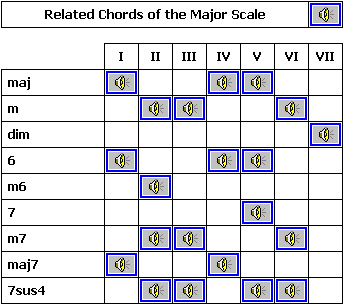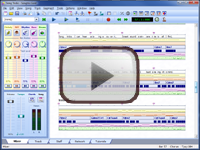(9.4) Using Related Chords
When you know the scale of your new song, you have a useful framework that will help you develop it, because it tells you which notes (those in the scale) you can use in the melody.
Perhaps even better, every scale has a group of related chords, built from its notes, which naturally sound appropriate for a piece of music written in the scale.

The related chords of a scale are especially important to composers, since they provide something of a musical thesaurus, prompting possibilities of which chord could be played next.
We saw tables of related chords of the C Major scale earlier, but the same information can be presented in a summary table for all Major scales, using roman numeral notation.
To use this table, simply assign the roman numerals to the notes of your scale. For example, with the C Major scale: I=C, II=D, III=E and so on. With the A Major scale: I=A, II=B, III=C♯ and so on.
Wherever a sound button appears, you can hear the sound of the related chord made from the root note in the column heading and the chord type in the row heading.

Note that while this table is useful, it is for the Major scale only, and contains only some of the many possible chord types.

In most ChordWizard products, the Relations View or the popup Relations tool can instantly show you all chords of any type which can be used for composition with music in any scale.
There are no absolute rules for which chords you can include in your song. Using the related chords of a scale will generally give better results, as they create a compatible background for the song's melody.
However, many excellent and innovative pieces of music use other chords as well. Usually, this is because they are changing keys during the music, and we'll look at this in more detail in a later topic.
|
Topic 111 of 117
| ||
Bring these music concepts to life with the free Songtrix Bronze Edition as you create songs from chords and scales.
Then publish and share your ideas with the other musicians you meet on the ChordWizard Network.
Have questions? Join the ChordWizard Network and post them in the Music Theory forum for answers and discussions on your topics of interest.








